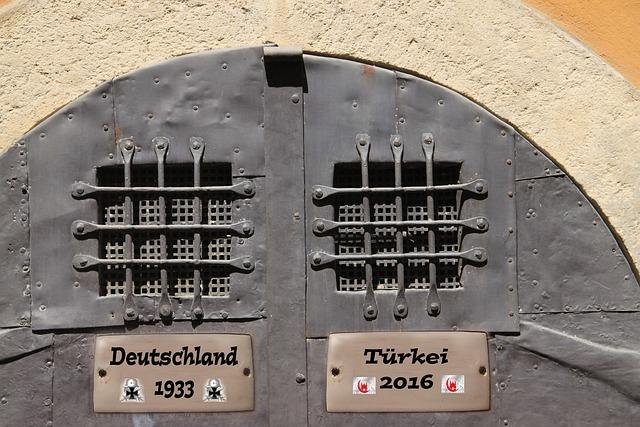In a recent statement that underscores Turkey’s evolving diplomatic landscape, President Recep Tayyip Erdogan emphasized the importance of human-centric policies as a driving force behind the nation’s strategic goals. Highlighting the need for a balanced approach that prioritizes the welfare of citizens both at home and abroad, Erdogan’s remarks resonate with Turkey’s commitment to fostering stability and cooperation in an increasingly complex geopolitical arena. This article delves into the implications of Erdogan’s vision, examining the ways in which these policies are shaping turkey’s foreign relations and domestic initiatives, while assessing their potential impact on both regional dynamics and global partnerships. As Turkey positions itself as a key player on the world stage, understanding the intersection of human-centered approaches and strategic interests becomes critical for comprehending the nation’s future trajectory.
Erdogan’s Vision for a Human-Centric Foreign Policy in Turkey
President Recep Tayyip Erdoğan’s commitment to a human-centric foreign policy marks a notable shift in turkey’s diplomatic approach,emphasizing the importance of human rights,social justice,and empowerment of marginalized communities on a global scale. This strategy is designed to enhance Turkey’s role as a key player in international politics while fostering stronger ties with nations that prioritize human welfare. By investing in humanitarian aid and development projects,Turkey aims to provide support to regions grappling with strife and instability,thereby creating a foundation for lasting peace and cooperation. Through this lens, Turkey is not only redefining its aid efforts but also positioning itself as a moral leader, encouraging other countries to adopt similar humane policies.
To operationalize this vision, the Turkish government is focusing on several key areas that reflect its dedication to human-centric values:
Humanitarian Aid: Increased funding and resources directed towards crisis-hit areas.
Diplomatic Engagement: Active participation in international initiatives aimed at human rights and social justice.
Cultural Exchange: Promotion of cultural understanding and dialogue through educational programs.
Refugee Support: Continued assistance for refugees and displaced persons, highlighting Turkey’s role as a host nation.
To better illustrate Turkey’s strategic goals,the following table summarizes the anticipated impact of its human-centric policies on international relations:
Area of Focus
expected Outcome
Humanitarian Aid
Improved living conditions in conflict zones
Diplomatic Engagement
Stronger alliances with human rights advocates
Cultural Exchange
Enhanced mutual understanding between nations
Refugee Support
Greater stability in neighboring regions

Key Pillars of Turkey’s Strategic Goals focused on Human Development
Turkey’s strategic goals are increasingly oriented towards enhancing human development, emphasizing the well-being and empowerment of its citizens. Under the leadership of President Erdogan, the government has identified several key areas aimed at fostering a holistic approach to human capital. These areas include:
Education and Lifelong Learning: Investments in modernizing the education system to ensure accessibility, innovation, and relevance to the job market.
Health Services expansion: Enhancing healthcare infrastructure to improve the quality of life through accessible and affordable medical services.
Social Justice and Equality: Implementing policies aimed at reducing social disparities, promoting gender equality, and supporting marginalized communities.
Economic Empowerment: Providing opportunities for entrepreneurship and skill development programs to stimulate local economies and job creation.
Moreover, Turkey’s strategic goals focus on a collective vision that aligns national policies with global sustainable development objectives. The government aims to integrate these initiatives into broader frameworks to secure future growth. A recent initiative highlights the importance of collaboration with international organizations and stakeholders to bolster these human-centric policies. The table below summarizes the expected outcomes associated with these strategic goals:
Strategic Goal
Expected Outcome
Education Reform
Increased literacy rates and workforce readiness
Healthcare Improvements
Enhanced national health indicators and reduced mortality rates
Social Equality
more inclusive policies leading to equitable resource distribution
Economic Development
Higher employment rates and strengthened local economies

Assessing the Impact of Human Rights Initiatives on Regional Diplomacy
The recent emphasis on human rights initiatives by Turkey has sparked a re-evaluation of its diplomatic strategies within the region. President Erdogan’s management has underscored its commitment to human-centric policies as a cornerstone of its international relations. This pivot towards advocacy for human rights not only seeks to bolster Turkey’s moral standing but also aims to pave the way for enhanced cooperation with allies and neighboring countries. Such initiatives have included programs focused on refugee support,women’s rights,and child protection,which not only resonate deeply with global values but also align Turkey with broader international legislative frameworks.
The effectiveness of these human rights initiatives can be assessed through a careful examination of their influence on Turkey’s regional diplomacy. By fostering a narrative that prioritizes human dignity, Turkey hopes to mitigate tensions with both its neighbors and larger geopolitical players. Factors to consider include:
Dialogue Facilitation: Encouraging open discussions around human rights to reduce hostilities.
Coalition Building: Forming alliances with nations invested in human rights advocacy.
Investment in Soft Power: Utilizing humanitarian efforts as a tool for influence and diplomacy.
As Turkey further aligns its strategic objectives with its human rights agenda, the potential for a shift in regional power dynamics becomes increasingly evident. Below is a summary of the projected impact areas:
Impact Area
Potential Outcomes
Diplomatic Relations
Strengthened ties with like-minded nations
Conflict Resolution
Potential easing of regional tensions
Global Reputation
Enhanced standing in the international community

Building International Alliances Through Human-Centric Approaches
In an era where global dynamics are continually shifting, Turkey’s commitment to a human-centric approach serves as a robust framework for fostering international alliances. President Erdogan has emphasized that policies centered around human welfare can considerably enhance diplomatic ties and economic partnerships. These principles not only aim to uplift the standard of living within Turkey but also seek to establish a foundation for cooperation with other nations based on mutual respect and shared values. This proactive strategy reflects a growing understanding that investment in human capital is essential for a nation’s long-term stability and influence on the global stage.
The essence of this approach is encapsulated in Turkey’s strategies intended to address critical areas such as economic development, education, and healthcare. By focusing on the well-being of individuals, Turkey is forging paths for collaboration that resonate beyond mere political alliances. Key objectives include:
Enhancing Economic Opportunities: Creating job opportunities that foster sustainable growth.
Promoting Cultural Exchange: Encouraging dialogue and understanding among diverse communities.
Strengthening Human Rights: Advocating for the essential rights of individuals in various regions.
This commitment is evident not only in Turkey’s domestic policies but also in its international outreach, where it actively collaborates with organizations aimed at humanitarian aid and development projects worldwide. The integration of human-centric policies into strategic goals positions Turkey as a pivotal player in global diplomacy, highlighting its role as a bridge between cultures and a champion for human dignity.

Recommendations for Strengthening Turkey’s Global Humanitarian Role
To bolster its position as a leading humanitarian force on the global stage, Turkey should consider implementing several strategic initiatives. First, enhancing collaboration with international organizations and ngos could amplify Turkey’s impact by pooling resources and expertise. Establishing formal partnerships with entities like the United Nations and the Red Cross can foster more effective response mechanisms in crisis situations. Furthermore, engaging in joint training programs can help improve the effectiveness of humanitarian aid delivery and disaster response.
second, Turkey must prioritize openness and accountability in its humanitarian efforts to build trust among international stakeholders. this could involve launching a comprehensive reporting framework to showcase the country’s contributions and the outcomes of its aid initiatives. Additionally, investing in local capacity building in affected regions ensures that humanitarian efforts are sustainable. By providing education and resources, Turkey can empower communities to respond to their own needs, ultimately creating a resilient and self-sustaining model for humanitarian assistance.

Future Prospects: Balancing National Interests with Global Human Welfare
As nations navigate the complexities of an interconnected world, the challenge of harmonizing national interests with global human welfare becomes increasingly vital. Turkey’s approach, as articulated by President Erdogan, emphasizes a strategic shift from traditional power dynamics towards a more human-centric policy framework. This paradigm not only seeks to bolster national security and economic growth but also aligns with broader humanitarian goals. The government aims to position turkey as a regional leader in advocating for humanitarian crises resolution and sustainable development by fostering international partnerships that promote peace and collective security.
To effectively implement these human-centric policies, Turkey’s strategy involves several key elements:
Diplomatic engagement: Strengthening ties with international organizations focused on humanitarian aid.
Economic Initiatives: Promoting trade agreements that support sustainable industries and job creation.
Community Development: Investing in local initiatives that empower vulnerable populations.
This multifaceted approach not only seeks to address immediate humanitarian needs but also builds a framework for long-term solutions that can enhance regional stability and prosperity. In this light, turkey’s policies provide a unique model for balancing its national interests with the imperative of global human welfare, creating a blueprint that other nations may look to emulate.
To conclude
President Erdogan’s emphasis on human-centric policies marks a significant shift in Turkey’s strategic objectives, aiming to align national interests with the welfare of its citizens. This approach seeks not only to enhance Turkey’s international standing but also to address pressing domestic challenges. As these policies continue to evolve, it will be crucial for observers to monitor their impact on both Turkey’s geopolitical landscape and the everyday lives of its people. With Erdogan at the helm, the intertwining of human rights and national strategy may serve as a blueprint for other nations facing similar dilemmas, ultimately shaping a more inclusive and sustainable future for turkey and its role in the global arena. AL24 News will continue to provide insights and updates on this evolving narrative.
—-
Author : Asia-News
Publish date : 2025-03-18 06:19:43
Copyright for syndicated content belongs to the linked Source.